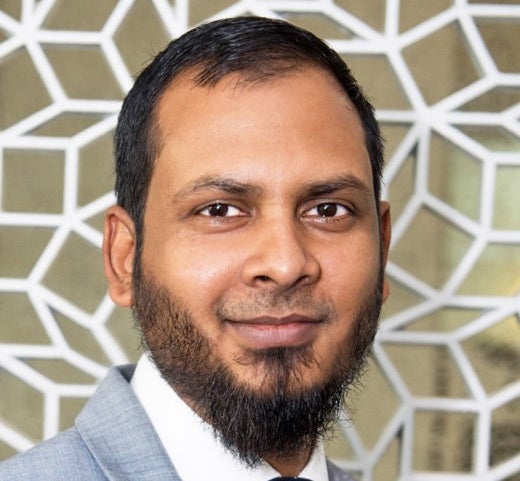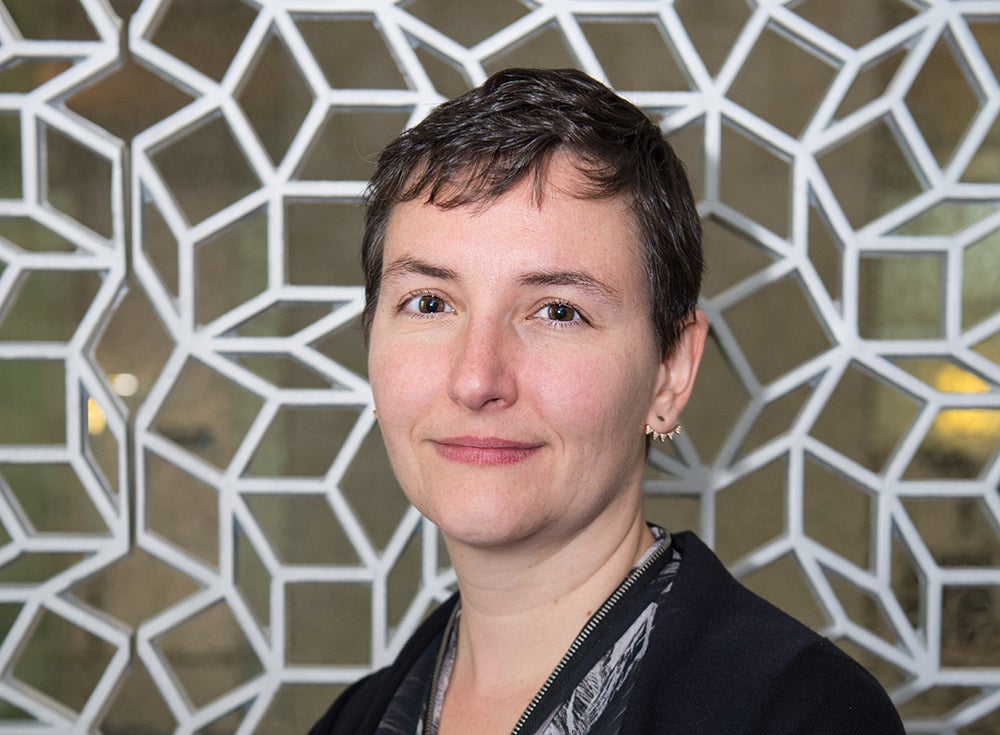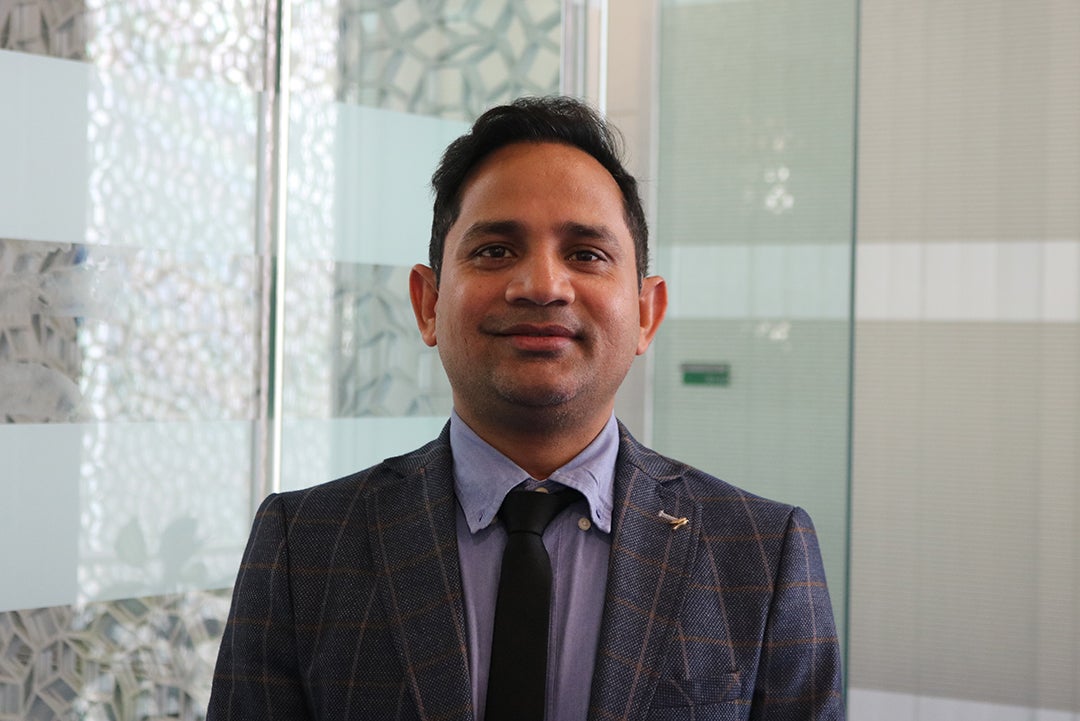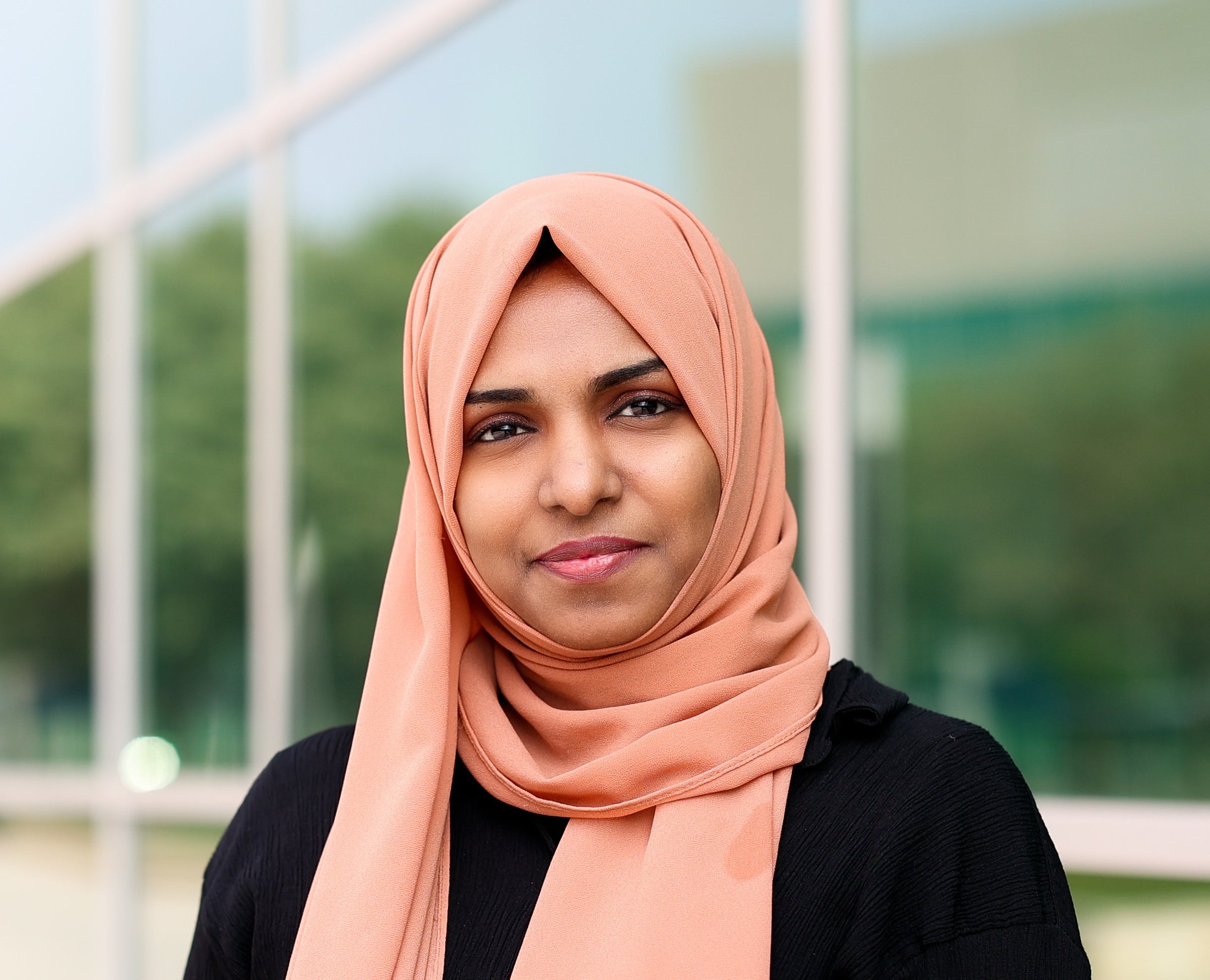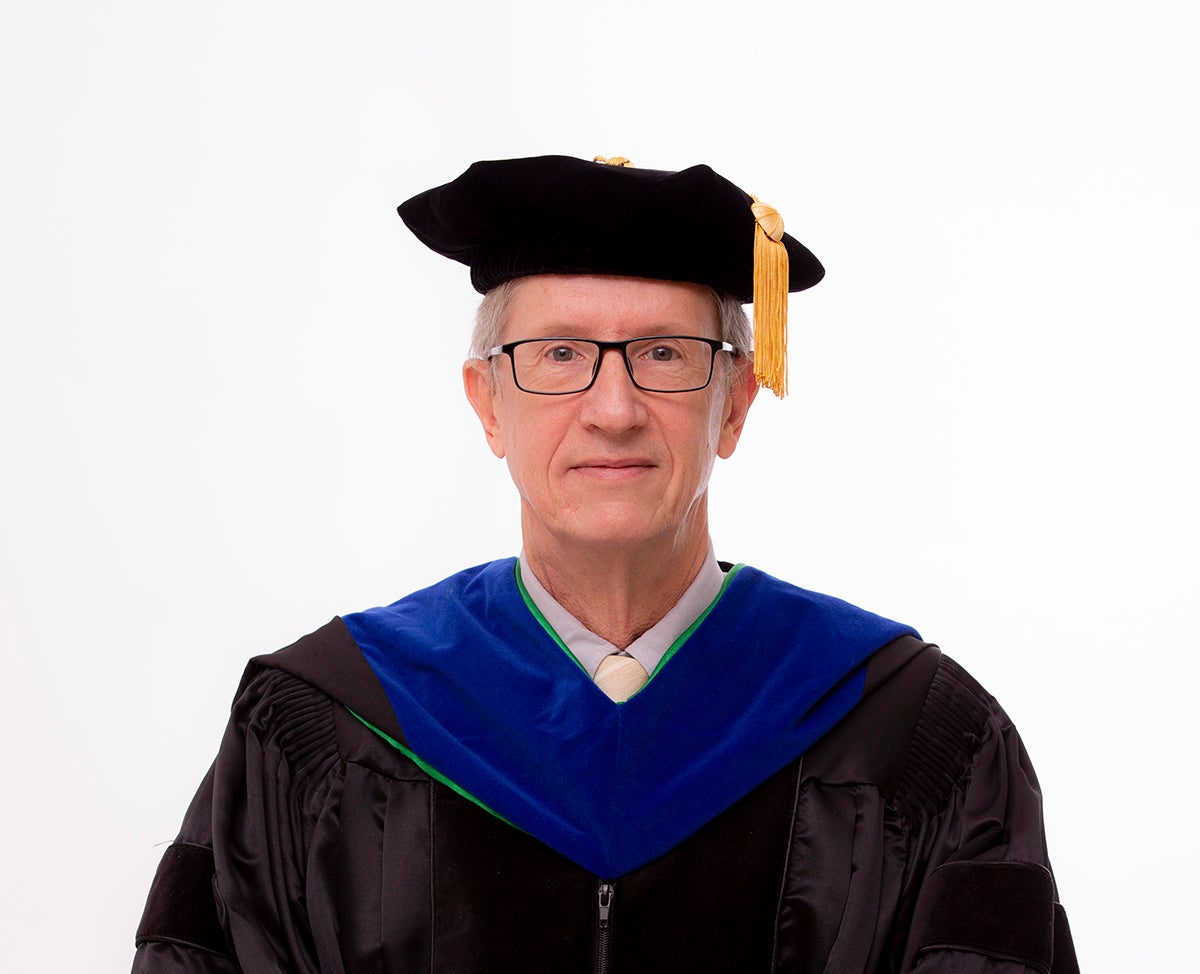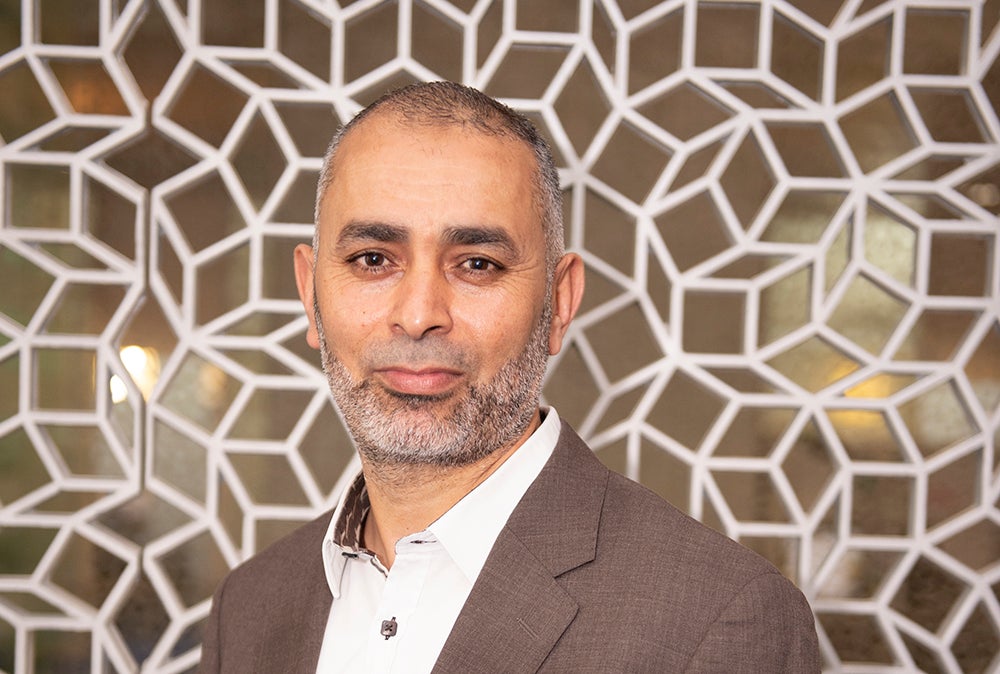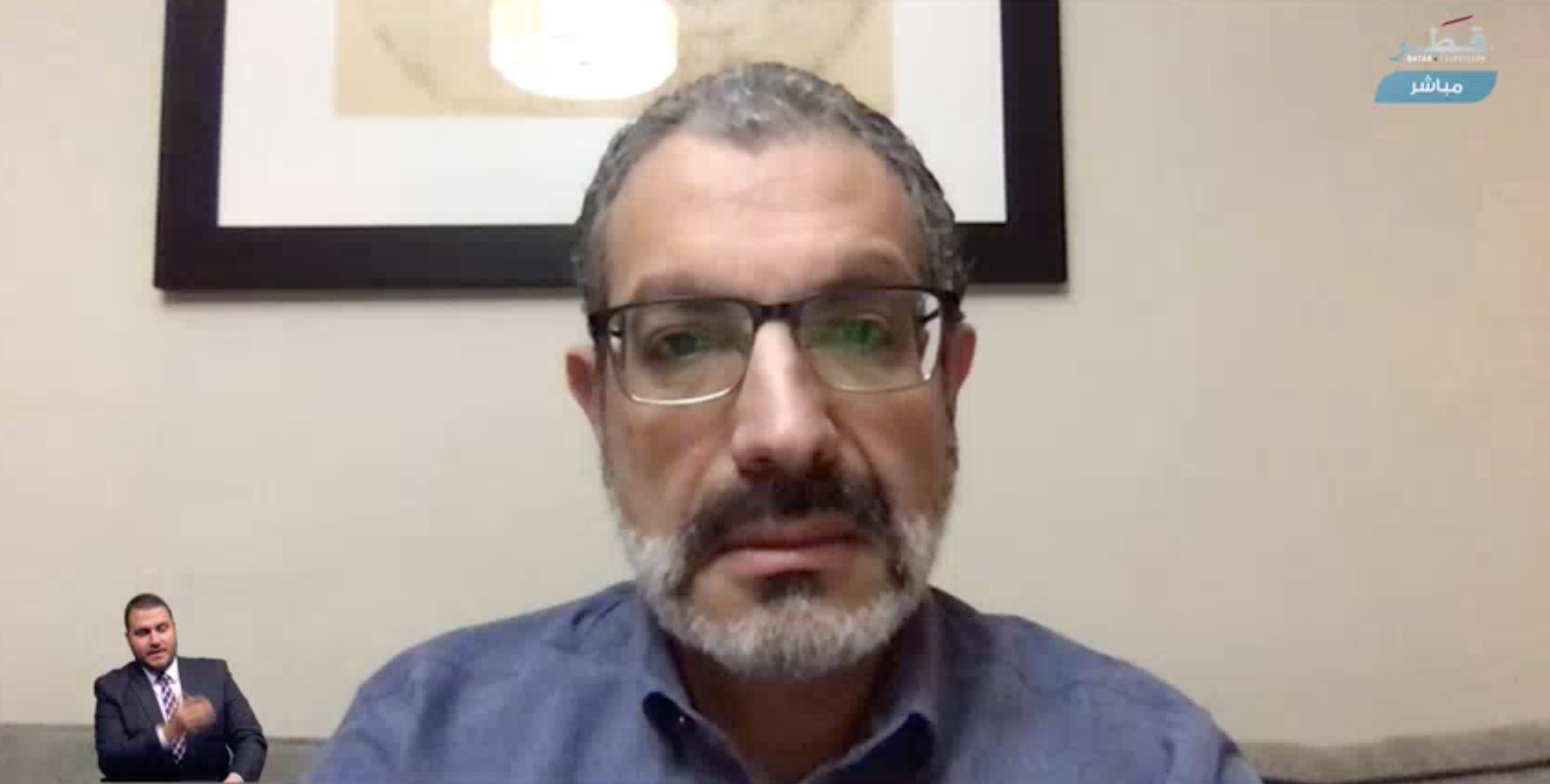
HBKU’s Research at Sidra Medicine Conference Advances Biomedical Sciences
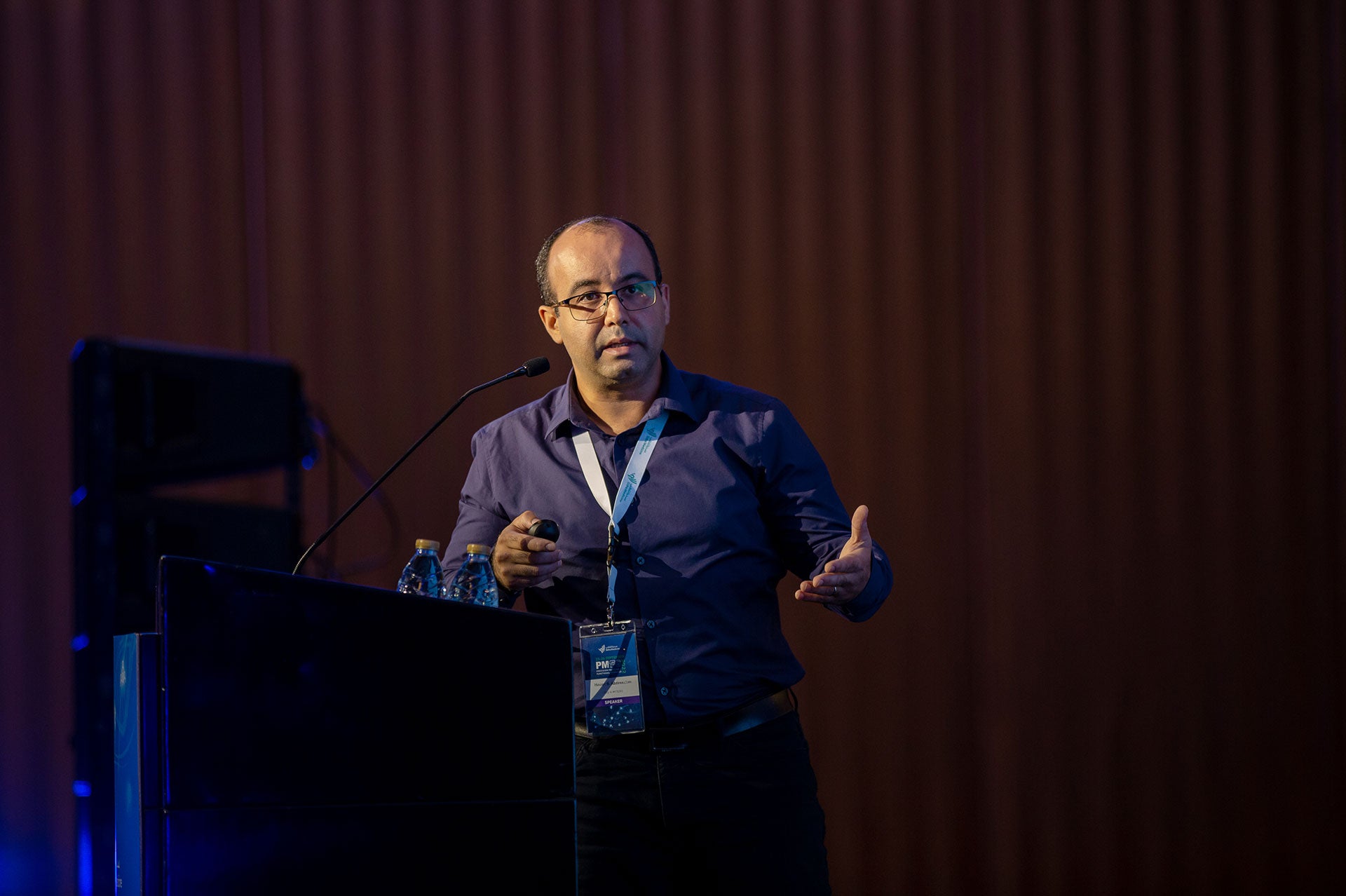
The College of Health and Life Sciences (CHLS) and Qatar Biomedical Research Institute (QBRI) demonstrated their clinical and scientific expertise during Sidra Medicine’s Sixth Precision Medicine and Functional Genomics Symposium (PMFG 2022).
The annual conference is part of Sidra Medicine’s goal to actively engage clinical and scientific expertise and establish a leading model for precision medicine in the region. HBKU’s participation highlighted the advanced research being conducted in the field of biomedical and health sciences, at its colleges and national research institutes.
The four-day event, held from September 23-26, brought together local and international researchers, healthcare professionals, policymakers, and community members to explore the latest developments and innovations in biomedical research and how they translate into precision medicine solutions.
QBRI and CHLS led with contributions on day two, during a session discussing the value of precision drug screening and technology platforms available in Qatar, for advanced genomics, proteomics, imaging, and flow cytometry.
Dr. Houari B. Abdesselem, Laboratory Manager at the Neurological Disorders Research Center (NDRC), and Jilbin Sam Plammoottil George, QBRI, presented “Defining Key Platforms in QBRI Core Lab Facilities: Sengenics Autoantibody Profiling, Olink Proteomics, and Cytometry Technologies”. Their session was co-chaired by Dr. Julie Decock, Scientist at the Translational Cancer and Immunity Center, QBRI. Dr. Decock also gave a talk titled “Computational identification of an immune-related 3-lncRNA signature with prognostic connotation in a multi-cancer setting”.
Dr. Davide Bedognetti, Adjunct Associate Professor at CHLS and Executive Director of the Translational Medicine Department at Sidra Medicine, chaired the day’s final session on “Pediatric Cancer Immunotherapy”, focusing on novel and recent developments in this area.
Day three focused on technologies and experimental approaches advancing translational genomics. Dr. Nady Al Hajj, Assistant Professor at CHLS, co-chaired a session on “Cell, organoid and animal models in translational genomics”. During the session, Dr. Essam M. Abdelalim, Scientist at the Diabetes Research Center, QBRI, presented “Induced pluripotent stem cells as a platform for precision medicine in diabetes”. His contribution aligned with the session’s aim to focus on in-vitro and in-vivo experimental approaches used to better understand human genetic disorders and how patient-derived cells and organoids are advancing precision medicine efforts.
Dr. Yongsoo Park, Scientist at QBRI’s NDRC, also spoke on the “Mutation of TRPC6, autism candidate gene, induces hyperexcitability of neurons by reducing store-operated calcium entry” during the “rapid talks” session.
CHLS continued to highlight their scientific contributions on the final day, which focused on precision medicine initiatives in Qatar and the MENA region. Dr. Omar Albagha, Professor, discussed the “Identification of genetic loci associated with serum levels of thyroid hormones in the Qatari population”; and Dr. Puthen Veettil Jithesh, Associate Professor, addressed the “Actionable pharmacogenomic landscape of the Qatari population”.
Dr. Abdelalim also co-chaired a session “Precision Medicine in the Middle East”, which aimed to understand how large-scale genome sequencing efforts are changing medicine and how molecular diagnostics and disease subtyping improves the quality of patient care.
Dr. Wouter Hendrickx, Adjunct Assistant Professor at CHLS, and Principal Investigator of the Functional Cancer Omics Laboratory, Sidra Medicine, co-presented a new study highlighting “The precision oncology platform for pediatric solid tumors at Sidra Medicine”. The study was conducted by Shimaa Sherif (first author) as part of her PhD thesis at HBKU, with Dr. Hendrickx serving as leading senior author.
Related News
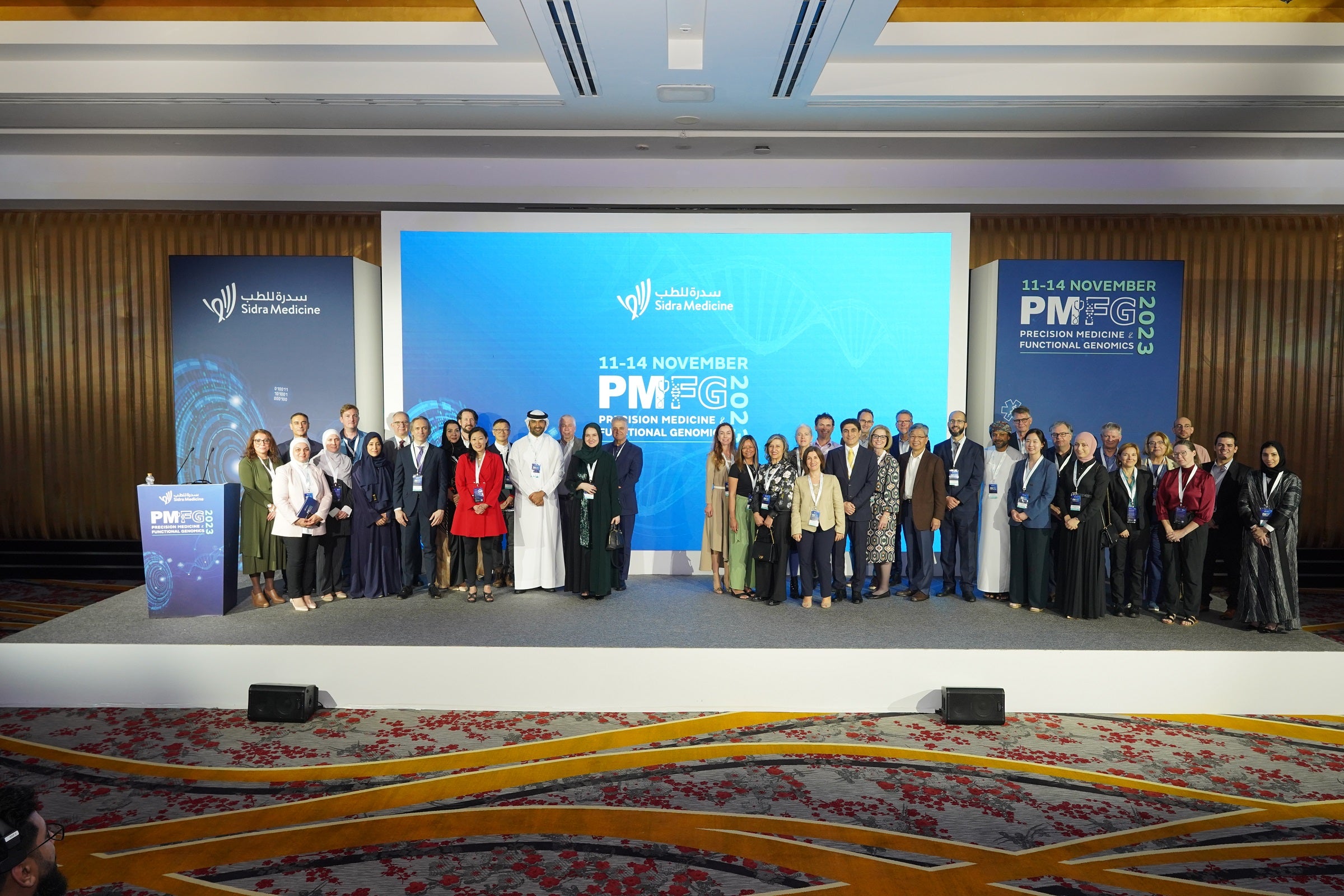
HBKU Participates at Sidra Medicine’s 9th Precision Medicine and Functional Genomics Conference
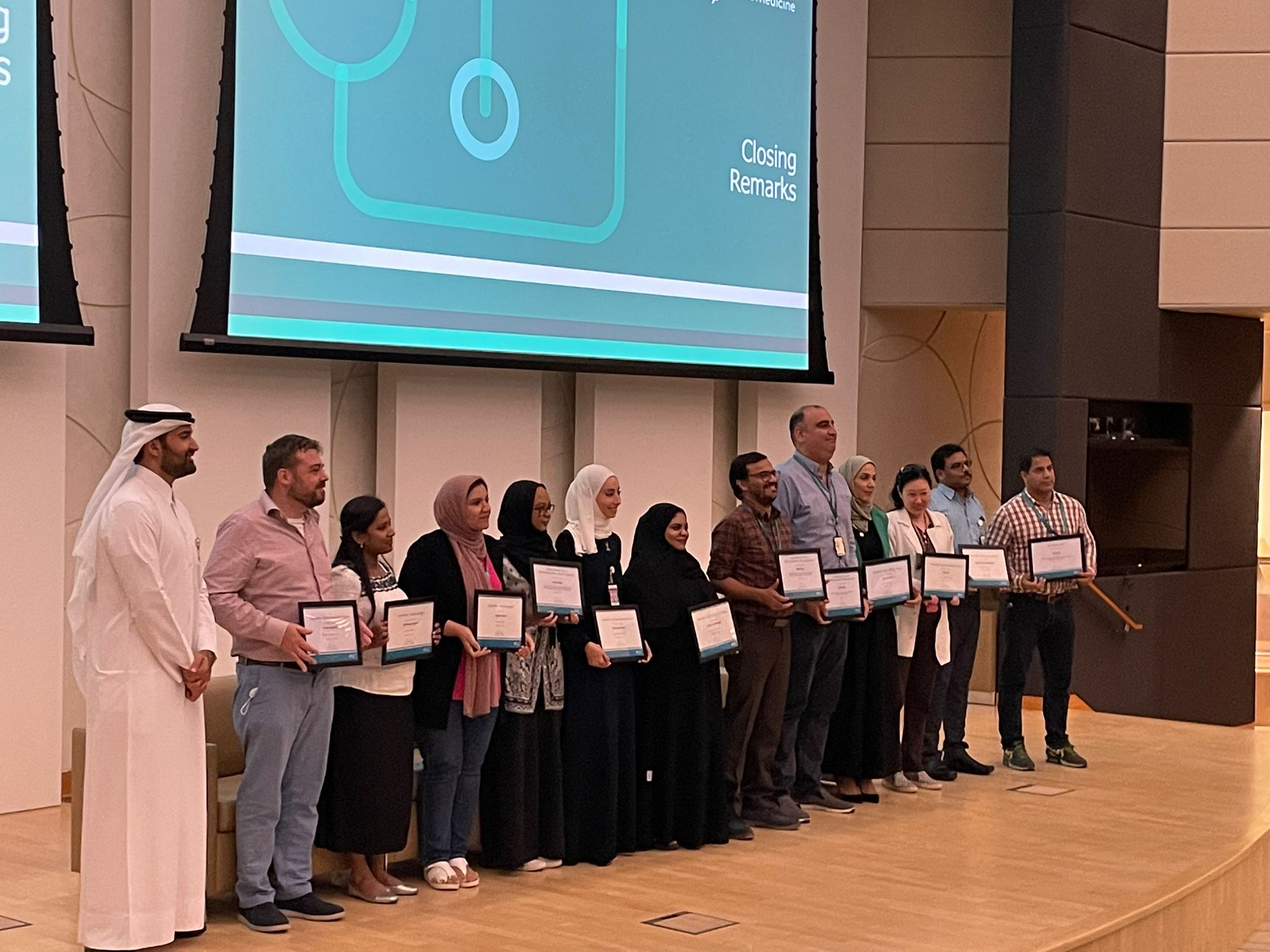
Doctorate Student at HBKU’s College of Health and Life Sciences Receives Specialist Author Award
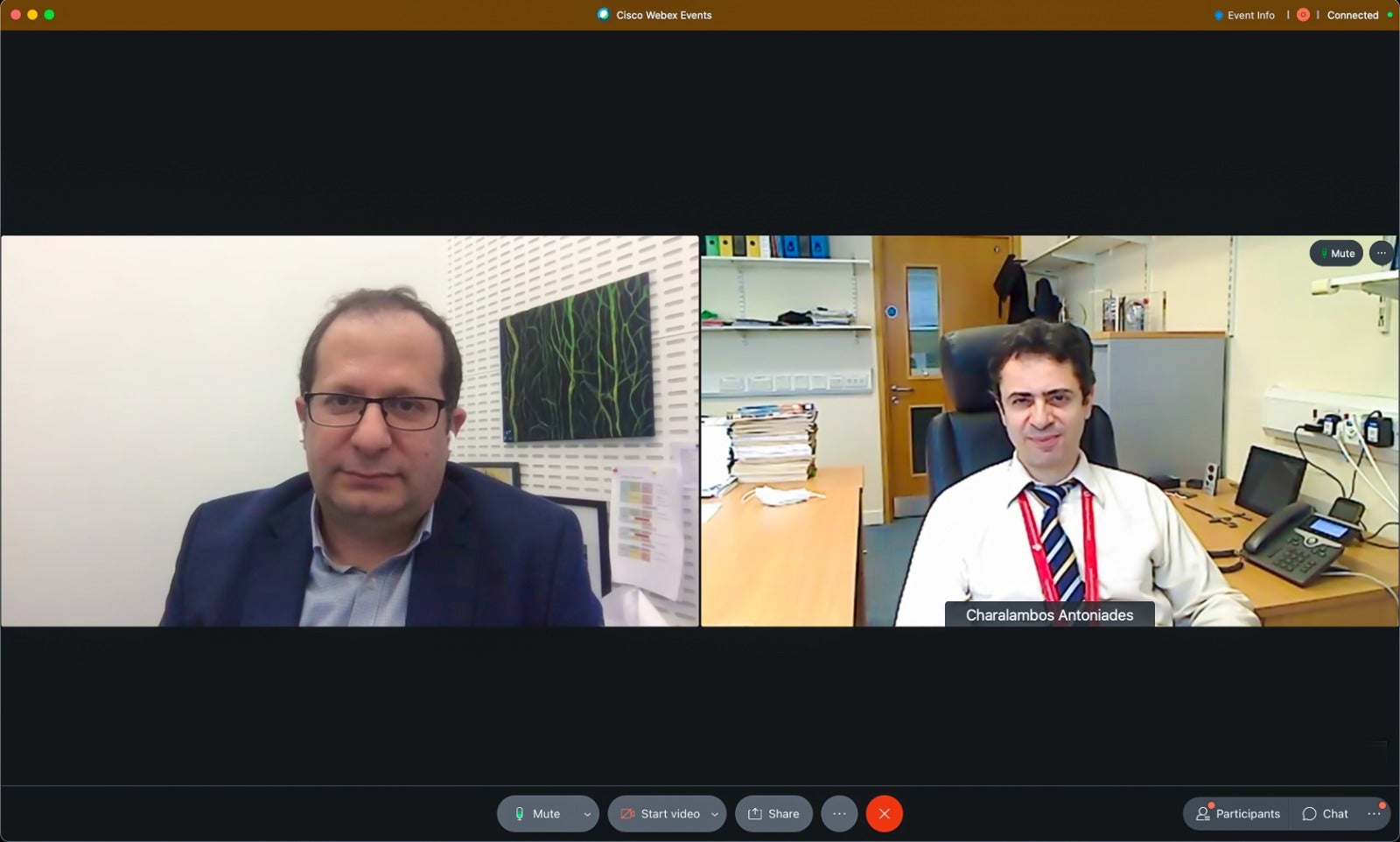
CHLS Presents Webinar on Advances in Early Detection of Heart and Brain Diseases
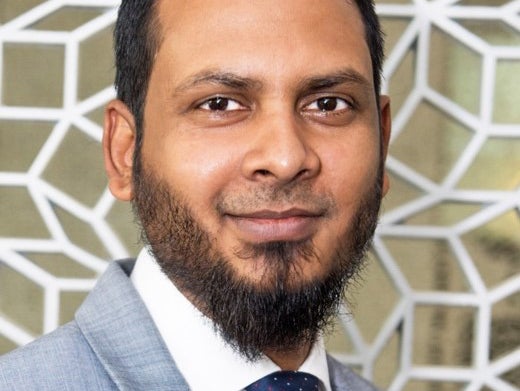
Vaccination is Vital Not Only for Individual Health but Also to Thwart the Pandemic
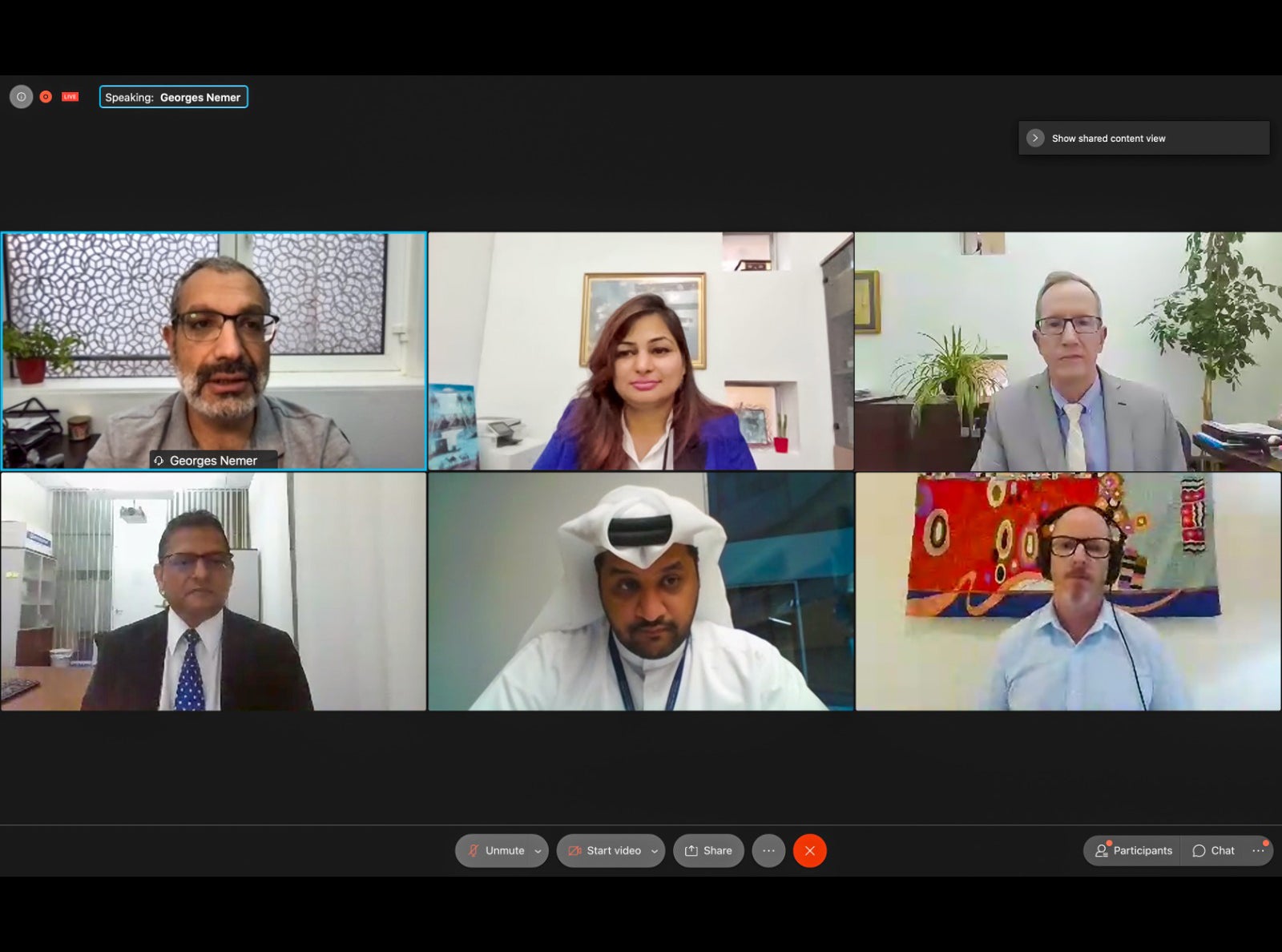
College of Health and Life Sciences Highlights Graduate Degree Programs at Virtual Information Session
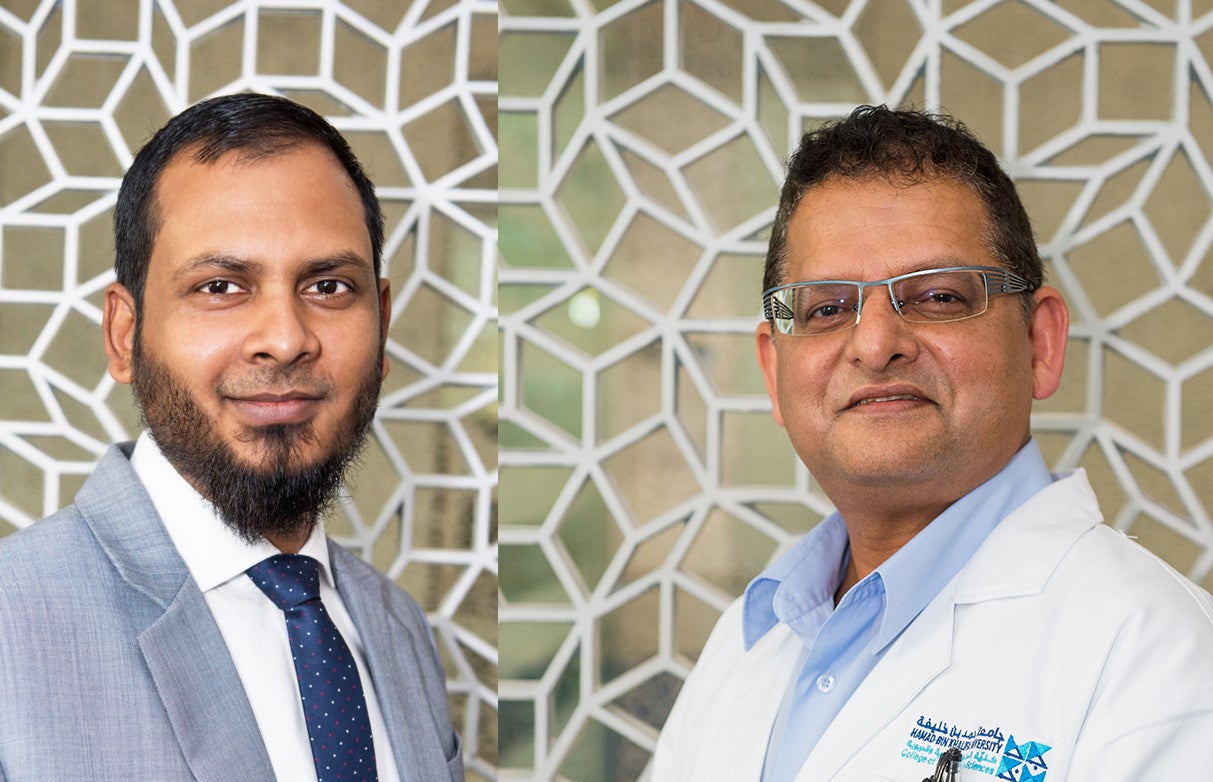
HBKU’s College of Health and Life Sciences Highlights Potential New Applications for Selective Enzyme Inhibitors in Leading Journal

HBKU’s College of Health and Life Science Highlights Potential for Research Exchange at Qatar-Poland Roundtable

HBKU’s College of Health and Life Sciences Collaborates on Computational Analysis for Potential Drug Repurposing
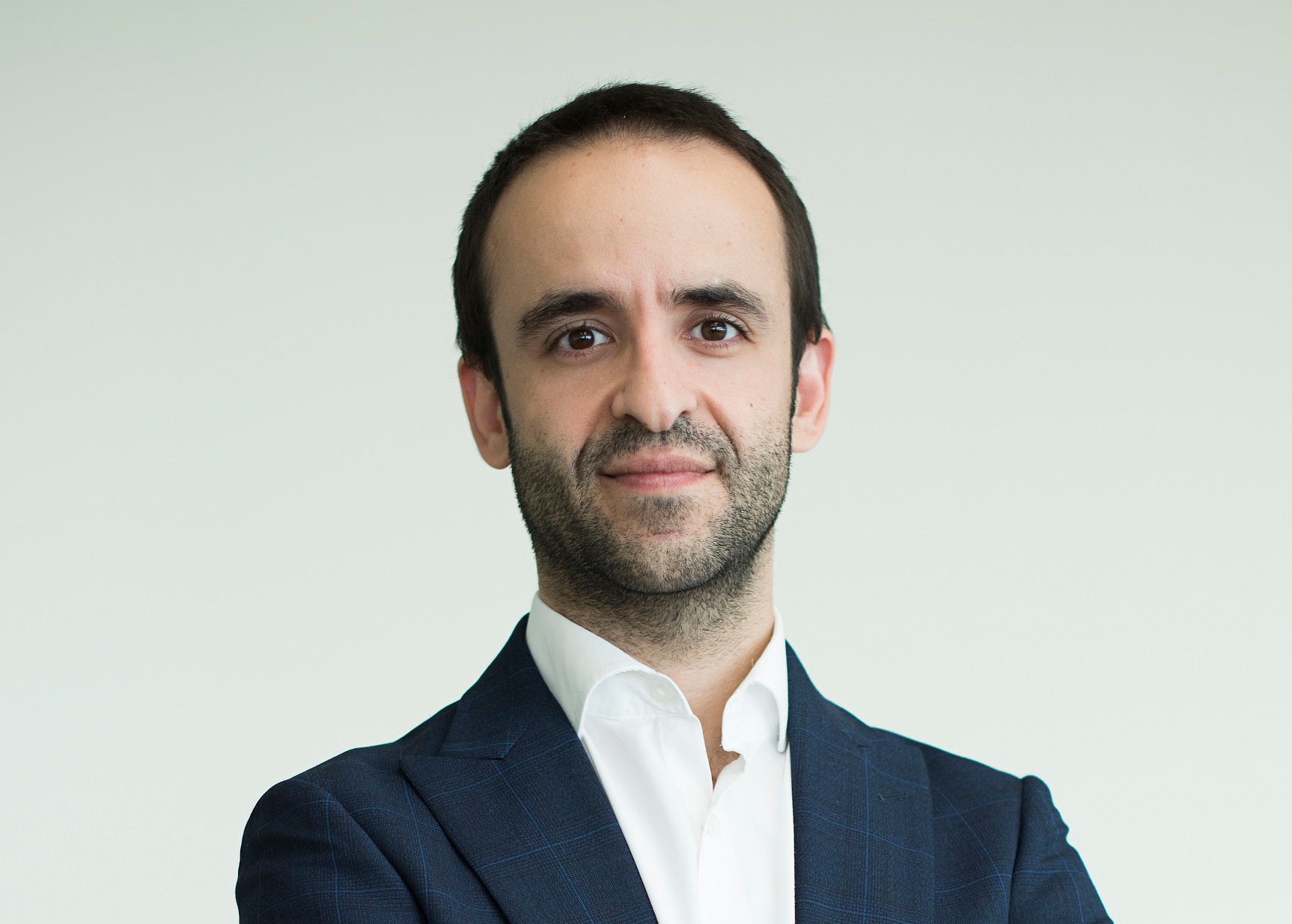
HBKU’s College of Health and Life Sciences Participates at Sidra Medicine's Precision Medicine and Functional Genomics Symposium
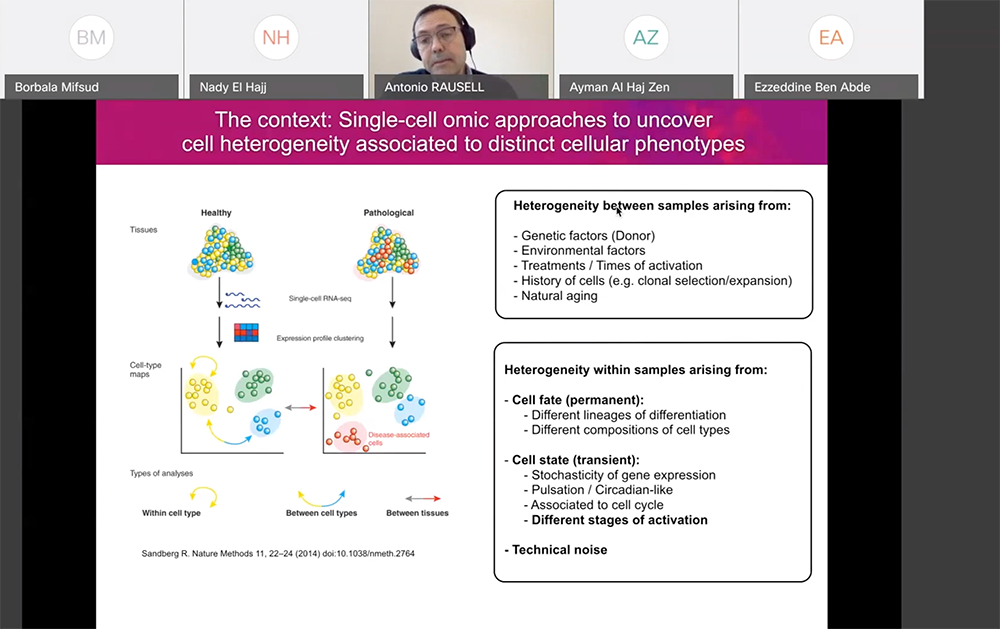
HBKU’s College of Health and Life Sciences Organizes Single-Cell Genomics Symposium

HBKU Participates at Sidra Medicine’s 9th Precision Medicine and Functional Genomics Conference

Doctorate Student at HBKU’s College of Health and Life Sciences Receives Specialist Author Award

CHLS Presents Webinar on Advances in Early Detection of Heart and Brain Diseases

Vaccination is Vital Not Only for Individual Health but Also to Thwart the Pandemic

College of Health and Life Sciences Highlights Graduate Degree Programs at Virtual Information Session

HBKU’s College of Health and Life Sciences Highlights Potential New Applications for Selective Enzyme Inhibitors in Leading Journal

HBKU’s College of Health and Life Science Highlights Potential for Research Exchange at Qatar-Poland Roundtable

HBKU’s College of Health and Life Sciences Collaborates on Computational Analysis for Potential Drug Repurposing

HBKU’s College of Health and Life Sciences Participates at Sidra Medicine's Precision Medicine and Functional Genomics Symposium

HBKU’s College of Health and Life Sciences Organizes Single-Cell Genomics Symposium

HBKU Participates at Sidra Medicine’s 9th Precision Medicine and Functional Genomics Conference

Doctorate Student at HBKU’s College of Health and Life Sciences Receives Specialist Author Award

CHLS Presents Webinar on Advances in Early Detection of Heart and Brain Diseases

Vaccination is Vital Not Only for Individual Health but Also to Thwart the Pandemic

College of Health and Life Sciences Highlights Graduate Degree Programs at Virtual Information Session

HBKU’s College of Health and Life Sciences Highlights Potential New Applications for Selective Enzyme Inhibitors in Leading Journal

HBKU’s College of Health and Life Science Highlights Potential for Research Exchange at Qatar-Poland Roundtable

HBKU’s College of Health and Life Sciences Collaborates on Computational Analysis for Potential Drug Repurposing

HBKU’s College of Health and Life Sciences Participates at Sidra Medicine's Precision Medicine and Functional Genomics Symposium

HBKU’s College of Health and Life Sciences Organizes Single-Cell Genomics Symposium

HBKU Participates at Sidra Medicine’s 9th Precision Medicine and Functional Genomics Conference

Doctorate Student at HBKU’s College of Health and Life Sciences Receives Specialist Author Award

CHLS Presents Webinar on Advances in Early Detection of Heart and Brain Diseases

Vaccination is Vital Not Only for Individual Health but Also to Thwart the Pandemic

College of Health and Life Sciences Highlights Graduate Degree Programs at Virtual Information Session

HBKU’s College of Health and Life Sciences Highlights Potential New Applications for Selective Enzyme Inhibitors in Leading Journal

HBKU’s College of Health and Life Science Highlights Potential for Research Exchange at Qatar-Poland Roundtable

HBKU’s College of Health and Life Sciences Collaborates on Computational Analysis for Potential Drug Repurposing

HBKU’s College of Health and Life Sciences Participates at Sidra Medicine's Precision Medicine and Functional Genomics Symposium

HBKU’s College of Health and Life Sciences Organizes Single-Cell Genomics Symposium

HBKU Participates at Sidra Medicine’s 9th Precision Medicine and Functional Genomics Conference

Doctorate Student at HBKU’s College of Health and Life Sciences Receives Specialist Author Award

CHLS Presents Webinar on Advances in Early Detection of Heart and Brain Diseases

Vaccination is Vital Not Only for Individual Health but Also to Thwart the Pandemic

College of Health and Life Sciences Highlights Graduate Degree Programs at Virtual Information Session

HBKU’s College of Health and Life Sciences Highlights Potential New Applications for Selective Enzyme Inhibitors in Leading Journal

HBKU’s College of Health and Life Science Highlights Potential for Research Exchange at Qatar-Poland Roundtable

HBKU’s College of Health and Life Sciences Collaborates on Computational Analysis for Potential Drug Repurposing

HBKU’s College of Health and Life Sciences Participates at Sidra Medicine's Precision Medicine and Functional Genomics Symposium

HBKU’s College of Health and Life Sciences Organizes Single-Cell Genomics Symposium

HBKU Participates at Sidra Medicine’s 9th Precision Medicine and Functional Genomics Conference

Doctorate Student at HBKU’s College of Health and Life Sciences Receives Specialist Author Award

CHLS Presents Webinar on Advances in Early Detection of Heart and Brain Diseases

Vaccination is Vital Not Only for Individual Health but Also to Thwart the Pandemic

College of Health and Life Sciences Highlights Graduate Degree Programs at Virtual Information Session

HBKU’s College of Health and Life Sciences Highlights Potential New Applications for Selective Enzyme Inhibitors in Leading Journal

HBKU’s College of Health and Life Science Highlights Potential for Research Exchange at Qatar-Poland Roundtable

HBKU’s College of Health and Life Sciences Collaborates on Computational Analysis for Potential Drug Repurposing

HBKU’s College of Health and Life Sciences Participates at Sidra Medicine's Precision Medicine and Functional Genomics Symposium

HBKU’s College of Health and Life Sciences Organizes Single-Cell Genomics Symposium

HBKU Participates at Sidra Medicine’s 9th Precision Medicine and Functional Genomics Conference

Doctorate Student at HBKU’s College of Health and Life Sciences Receives Specialist Author Award

CHLS Presents Webinar on Advances in Early Detection of Heart and Brain Diseases

Vaccination is Vital Not Only for Individual Health but Also to Thwart the Pandemic

College of Health and Life Sciences Highlights Graduate Degree Programs at Virtual Information Session

HBKU’s College of Health and Life Sciences Highlights Potential New Applications for Selective Enzyme Inhibitors in Leading Journal

HBKU’s College of Health and Life Science Highlights Potential for Research Exchange at Qatar-Poland Roundtable

HBKU’s College of Health and Life Sciences Collaborates on Computational Analysis for Potential Drug Repurposing

HBKU’s College of Health and Life Sciences Participates at Sidra Medicine's Precision Medicine and Functional Genomics Symposium

HBKU’s College of Health and Life Sciences Organizes Single-Cell Genomics Symposium

HBKU Participates at Sidra Medicine’s 9th Precision Medicine and Functional Genomics Conference

Doctorate Student at HBKU’s College of Health and Life Sciences Receives Specialist Author Award

CHLS Presents Webinar on Advances in Early Detection of Heart and Brain Diseases

Vaccination is Vital Not Only for Individual Health but Also to Thwart the Pandemic

College of Health and Life Sciences Highlights Graduate Degree Programs at Virtual Information Session

HBKU’s College of Health and Life Sciences Highlights Potential New Applications for Selective Enzyme Inhibitors in Leading Journal

HBKU’s College of Health and Life Science Highlights Potential for Research Exchange at Qatar-Poland Roundtable

HBKU’s College of Health and Life Sciences Collaborates on Computational Analysis for Potential Drug Repurposing

HBKU’s College of Health and Life Sciences Participates at Sidra Medicine's Precision Medicine and Functional Genomics Symposium

HBKU’s College of Health and Life Sciences Organizes Single-Cell Genomics Symposium

HBKU Participates at Sidra Medicine’s 9th Precision Medicine and Functional Genomics Conference

Doctorate Student at HBKU’s College of Health and Life Sciences Receives Specialist Author Award

CHLS Presents Webinar on Advances in Early Detection of Heart and Brain Diseases

Vaccination is Vital Not Only for Individual Health but Also to Thwart the Pandemic

College of Health and Life Sciences Highlights Graduate Degree Programs at Virtual Information Session

HBKU’s College of Health and Life Sciences Highlights Potential New Applications for Selective Enzyme Inhibitors in Leading Journal

HBKU’s College of Health and Life Science Highlights Potential for Research Exchange at Qatar-Poland Roundtable

HBKU’s College of Health and Life Sciences Collaborates on Computational Analysis for Potential Drug Repurposing

HBKU’s College of Health and Life Sciences Participates at Sidra Medicine's Precision Medicine and Functional Genomics Symposium

HBKU’s College of Health and Life Sciences Organizes Single-Cell Genomics Symposium

HBKU Participates at Sidra Medicine’s 9th Precision Medicine and Functional Genomics Conference

Doctorate Student at HBKU’s College of Health and Life Sciences Receives Specialist Author Award

CHLS Presents Webinar on Advances in Early Detection of Heart and Brain Diseases

Vaccination is Vital Not Only for Individual Health but Also to Thwart the Pandemic

College of Health and Life Sciences Highlights Graduate Degree Programs at Virtual Information Session

HBKU’s College of Health and Life Sciences Highlights Potential New Applications for Selective Enzyme Inhibitors in Leading Journal

HBKU’s College of Health and Life Science Highlights Potential for Research Exchange at Qatar-Poland Roundtable

HBKU’s College of Health and Life Sciences Collaborates on Computational Analysis for Potential Drug Repurposing

HBKU’s College of Health and Life Sciences Participates at Sidra Medicine's Precision Medicine and Functional Genomics Symposium

HBKU’s College of Health and Life Sciences Organizes Single-Cell Genomics Symposium

HBKU Participates at Sidra Medicine’s 9th Precision Medicine and Functional Genomics Conference

Doctorate Student at HBKU’s College of Health and Life Sciences Receives Specialist Author Award

CHLS Presents Webinar on Advances in Early Detection of Heart and Brain Diseases

Vaccination is Vital Not Only for Individual Health but Also to Thwart the Pandemic

College of Health and Life Sciences Highlights Graduate Degree Programs at Virtual Information Session

HBKU’s College of Health and Life Sciences Highlights Potential New Applications for Selective Enzyme Inhibitors in Leading Journal

HBKU’s College of Health and Life Science Highlights Potential for Research Exchange at Qatar-Poland Roundtable

HBKU’s College of Health and Life Sciences Collaborates on Computational Analysis for Potential Drug Repurposing

HBKU’s College of Health and Life Sciences Participates at Sidra Medicine's Precision Medicine and Functional Genomics Symposium

HBKU’s College of Health and Life Sciences Organizes Single-Cell Genomics Symposium

HBKU Participates at Sidra Medicine’s 9th Precision Medicine and Functional Genomics Conference

Doctorate Student at HBKU’s College of Health and Life Sciences Receives Specialist Author Award

CHLS Presents Webinar on Advances in Early Detection of Heart and Brain Diseases

Vaccination is Vital Not Only for Individual Health but Also to Thwart the Pandemic

College of Health and Life Sciences Highlights Graduate Degree Programs at Virtual Information Session

HBKU’s College of Health and Life Sciences Highlights Potential New Applications for Selective Enzyme Inhibitors in Leading Journal

HBKU’s College of Health and Life Science Highlights Potential for Research Exchange at Qatar-Poland Roundtable

HBKU’s College of Health and Life Sciences Collaborates on Computational Analysis for Potential Drug Repurposing

HBKU’s College of Health and Life Sciences Participates at Sidra Medicine's Precision Medicine and Functional Genomics Symposium

HBKU’s College of Health and Life Sciences Organizes Single-Cell Genomics Symposium

HBKU Participates at Sidra Medicine’s 9th Precision Medicine and Functional Genomics Conference

Doctorate Student at HBKU’s College of Health and Life Sciences Receives Specialist Author Award

CHLS Presents Webinar on Advances in Early Detection of Heart and Brain Diseases

Vaccination is Vital Not Only for Individual Health but Also to Thwart the Pandemic

College of Health and Life Sciences Highlights Graduate Degree Programs at Virtual Information Session

HBKU’s College of Health and Life Sciences Highlights Potential New Applications for Selective Enzyme Inhibitors in Leading Journal

HBKU’s College of Health and Life Science Highlights Potential for Research Exchange at Qatar-Poland Roundtable

HBKU’s College of Health and Life Sciences Collaborates on Computational Analysis for Potential Drug Repurposing

HBKU’s College of Health and Life Sciences Participates at Sidra Medicine's Precision Medicine and Functional Genomics Symposium

HBKU’s College of Health and Life Sciences Organizes Single-Cell Genomics Symposium

HBKU Participates at Sidra Medicine’s 9th Precision Medicine and Functional Genomics Conference

Doctorate Student at HBKU’s College of Health and Life Sciences Receives Specialist Author Award

CHLS Presents Webinar on Advances in Early Detection of Heart and Brain Diseases

Vaccination is Vital Not Only for Individual Health but Also to Thwart the Pandemic

College of Health and Life Sciences Highlights Graduate Degree Programs at Virtual Information Session

HBKU’s College of Health and Life Sciences Highlights Potential New Applications for Selective Enzyme Inhibitors in Leading Journal

HBKU’s College of Health and Life Science Highlights Potential for Research Exchange at Qatar-Poland Roundtable

HBKU’s College of Health and Life Sciences Collaborates on Computational Analysis for Potential Drug Repurposing

HBKU’s College of Health and Life Sciences Participates at Sidra Medicine's Precision Medicine and Functional Genomics Symposium

HBKU’s College of Health and Life Sciences Organizes Single-Cell Genomics Symposium

HBKU Participates at Sidra Medicine’s 9th Precision Medicine and Functional Genomics Conference

Doctorate Student at HBKU’s College of Health and Life Sciences Receives Specialist Author Award

CHLS Presents Webinar on Advances in Early Detection of Heart and Brain Diseases

Vaccination is Vital Not Only for Individual Health but Also to Thwart the Pandemic

College of Health and Life Sciences Highlights Graduate Degree Programs at Virtual Information Session

HBKU’s College of Health and Life Sciences Highlights Potential New Applications for Selective Enzyme Inhibitors in Leading Journal

HBKU’s College of Health and Life Science Highlights Potential for Research Exchange at Qatar-Poland Roundtable

HBKU’s College of Health and Life Sciences Collaborates on Computational Analysis for Potential Drug Repurposing

HBKU’s College of Health and Life Sciences Participates at Sidra Medicine's Precision Medicine and Functional Genomics Symposium

HBKU’s College of Health and Life Sciences Organizes Single-Cell Genomics Symposium

HBKU Participates at Sidra Medicine’s 9th Precision Medicine and Functional Genomics Conference

Doctorate Student at HBKU’s College of Health and Life Sciences Receives Specialist Author Award

CHLS Presents Webinar on Advances in Early Detection of Heart and Brain Diseases

Vaccination is Vital Not Only for Individual Health but Also to Thwart the Pandemic

College of Health and Life Sciences Highlights Graduate Degree Programs at Virtual Information Session

HBKU’s College of Health and Life Sciences Highlights Potential New Applications for Selective Enzyme Inhibitors in Leading Journal

HBKU’s College of Health and Life Science Highlights Potential for Research Exchange at Qatar-Poland Roundtable

HBKU’s College of Health and Life Sciences Collaborates on Computational Analysis for Potential Drug Repurposing

HBKU’s College of Health and Life Sciences Participates at Sidra Medicine's Precision Medicine and Functional Genomics Symposium

HBKU’s College of Health and Life Sciences Organizes Single-Cell Genomics Symposium

HBKU Participates at Sidra Medicine’s 9th Precision Medicine and Functional Genomics Conference

Doctorate Student at HBKU’s College of Health and Life Sciences Receives Specialist Author Award

CHLS Presents Webinar on Advances in Early Detection of Heart and Brain Diseases

Vaccination is Vital Not Only for Individual Health but Also to Thwart the Pandemic

College of Health and Life Sciences Highlights Graduate Degree Programs at Virtual Information Session

HBKU’s College of Health and Life Sciences Highlights Potential New Applications for Selective Enzyme Inhibitors in Leading Journal

HBKU’s College of Health and Life Science Highlights Potential for Research Exchange at Qatar-Poland Roundtable

HBKU’s College of Health and Life Sciences Collaborates on Computational Analysis for Potential Drug Repurposing

HBKU’s College of Health and Life Sciences Participates at Sidra Medicine's Precision Medicine and Functional Genomics Symposium

HBKU’s College of Health and Life Sciences Organizes Single-Cell Genomics Symposium

HBKU Participates at Sidra Medicine’s 9th Precision Medicine and Functional Genomics Conference

Doctorate Student at HBKU’s College of Health and Life Sciences Receives Specialist Author Award

CHLS Presents Webinar on Advances in Early Detection of Heart and Brain Diseases

Vaccination is Vital Not Only for Individual Health but Also to Thwart the Pandemic

College of Health and Life Sciences Highlights Graduate Degree Programs at Virtual Information Session

HBKU’s College of Health and Life Sciences Highlights Potential New Applications for Selective Enzyme Inhibitors in Leading Journal

HBKU’s College of Health and Life Science Highlights Potential for Research Exchange at Qatar-Poland Roundtable

HBKU’s College of Health and Life Sciences Collaborates on Computational Analysis for Potential Drug Repurposing

HBKU’s College of Health and Life Sciences Participates at Sidra Medicine's Precision Medicine and Functional Genomics Symposium

HBKU’s College of Health and Life Sciences Organizes Single-Cell Genomics Symposium

HBKU Participates at Sidra Medicine’s 9th Precision Medicine and Functional Genomics Conference

Doctorate Student at HBKU’s College of Health and Life Sciences Receives Specialist Author Award

CHLS Presents Webinar on Advances in Early Detection of Heart and Brain Diseases

Vaccination is Vital Not Only for Individual Health but Also to Thwart the Pandemic

College of Health and Life Sciences Highlights Graduate Degree Programs at Virtual Information Session

HBKU’s College of Health and Life Sciences Highlights Potential New Applications for Selective Enzyme Inhibitors in Leading Journal

HBKU’s College of Health and Life Science Highlights Potential for Research Exchange at Qatar-Poland Roundtable

HBKU’s College of Health and Life Sciences Collaborates on Computational Analysis for Potential Drug Repurposing

HBKU’s College of Health and Life Sciences Participates at Sidra Medicine's Precision Medicine and Functional Genomics Symposium

HBKU’s College of Health and Life Sciences Organizes Single-Cell Genomics Symposium

HBKU Participates at Sidra Medicine’s 9th Precision Medicine and Functional Genomics Conference

Doctorate Student at HBKU’s College of Health and Life Sciences Receives Specialist Author Award

CHLS Presents Webinar on Advances in Early Detection of Heart and Brain Diseases

Vaccination is Vital Not Only for Individual Health but Also to Thwart the Pandemic

College of Health and Life Sciences Highlights Graduate Degree Programs at Virtual Information Session

HBKU’s College of Health and Life Sciences Highlights Potential New Applications for Selective Enzyme Inhibitors in Leading Journal

HBKU’s College of Health and Life Science Highlights Potential for Research Exchange at Qatar-Poland Roundtable

HBKU’s College of Health and Life Sciences Collaborates on Computational Analysis for Potential Drug Repurposing

HBKU’s College of Health and Life Sciences Participates at Sidra Medicine's Precision Medicine and Functional Genomics Symposium

HBKU’s College of Health and Life Sciences Organizes Single-Cell Genomics Symposium

HBKU Participates at Sidra Medicine’s 9th Precision Medicine and Functional Genomics Conference

Doctorate Student at HBKU’s College of Health and Life Sciences Receives Specialist Author Award

CHLS Presents Webinar on Advances in Early Detection of Heart and Brain Diseases

Vaccination is Vital Not Only for Individual Health but Also to Thwart the Pandemic

College of Health and Life Sciences Highlights Graduate Degree Programs at Virtual Information Session

HBKU’s College of Health and Life Sciences Highlights Potential New Applications for Selective Enzyme Inhibitors in Leading Journal

HBKU’s College of Health and Life Science Highlights Potential for Research Exchange at Qatar-Poland Roundtable

HBKU’s College of Health and Life Sciences Collaborates on Computational Analysis for Potential Drug Repurposing

HBKU’s College of Health and Life Sciences Participates at Sidra Medicine's Precision Medicine and Functional Genomics Symposium

HBKU’s College of Health and Life Sciences Organizes Single-Cell Genomics Symposium

HBKU Participates at Sidra Medicine’s 9th Precision Medicine and Functional Genomics Conference

Doctorate Student at HBKU’s College of Health and Life Sciences Receives Specialist Author Award

CHLS Presents Webinar on Advances in Early Detection of Heart and Brain Diseases

Vaccination is Vital Not Only for Individual Health but Also to Thwart the Pandemic

College of Health and Life Sciences Highlights Graduate Degree Programs at Virtual Information Session

HBKU’s College of Health and Life Sciences Highlights Potential New Applications for Selective Enzyme Inhibitors in Leading Journal

HBKU’s College of Health and Life Science Highlights Potential for Research Exchange at Qatar-Poland Roundtable

HBKU’s College of Health and Life Sciences Collaborates on Computational Analysis for Potential Drug Repurposing

HBKU’s College of Health and Life Sciences Participates at Sidra Medicine's Precision Medicine and Functional Genomics Symposium

HBKU’s College of Health and Life Sciences Organizes Single-Cell Genomics Symposium

HBKU Participates at Sidra Medicine’s 9th Precision Medicine and Functional Genomics Conference

Doctorate Student at HBKU’s College of Health and Life Sciences Receives Specialist Author Award

CHLS Presents Webinar on Advances in Early Detection of Heart and Brain Diseases

Vaccination is Vital Not Only for Individual Health but Also to Thwart the Pandemic

College of Health and Life Sciences Highlights Graduate Degree Programs at Virtual Information Session

HBKU’s College of Health and Life Sciences Highlights Potential New Applications for Selective Enzyme Inhibitors in Leading Journal

HBKU’s College of Health and Life Science Highlights Potential for Research Exchange at Qatar-Poland Roundtable

HBKU’s College of Health and Life Sciences Collaborates on Computational Analysis for Potential Drug Repurposing

HBKU’s College of Health and Life Sciences Participates at Sidra Medicine's Precision Medicine and Functional Genomics Symposium

HBKU’s College of Health and Life Sciences Organizes Single-Cell Genomics Symposium

HBKU Participates at Sidra Medicine’s 9th Precision Medicine and Functional Genomics Conference

Doctorate Student at HBKU’s College of Health and Life Sciences Receives Specialist Author Award

CHLS Presents Webinar on Advances in Early Detection of Heart and Brain Diseases

Vaccination is Vital Not Only for Individual Health but Also to Thwart the Pandemic

College of Health and Life Sciences Highlights Graduate Degree Programs at Virtual Information Session

HBKU’s College of Health and Life Sciences Highlights Potential New Applications for Selective Enzyme Inhibitors in Leading Journal

HBKU’s College of Health and Life Science Highlights Potential for Research Exchange at Qatar-Poland Roundtable

HBKU’s College of Health and Life Sciences Collaborates on Computational Analysis for Potential Drug Repurposing

HBKU’s College of Health and Life Sciences Participates at Sidra Medicine's Precision Medicine and Functional Genomics Symposium

HBKU’s College of Health and Life Sciences Organizes Single-Cell Genomics Symposium

HBKU Participates at Sidra Medicine’s 9th Precision Medicine and Functional Genomics Conference

Doctorate Student at HBKU’s College of Health and Life Sciences Receives Specialist Author Award

CHLS Presents Webinar on Advances in Early Detection of Heart and Brain Diseases

Vaccination is Vital Not Only for Individual Health but Also to Thwart the Pandemic

College of Health and Life Sciences Highlights Graduate Degree Programs at Virtual Information Session

HBKU’s College of Health and Life Sciences Highlights Potential New Applications for Selective Enzyme Inhibitors in Leading Journal

HBKU’s College of Health and Life Science Highlights Potential for Research Exchange at Qatar-Poland Roundtable

HBKU’s College of Health and Life Sciences Collaborates on Computational Analysis for Potential Drug Repurposing

HBKU’s College of Health and Life Sciences Participates at Sidra Medicine's Precision Medicine and Functional Genomics Symposium

HBKU’s College of Health and Life Sciences Organizes Single-Cell Genomics Symposium

HBKU Participates at Sidra Medicine’s 9th Precision Medicine and Functional Genomics Conference

Doctorate Student at HBKU’s College of Health and Life Sciences Receives Specialist Author Award

CHLS Presents Webinar on Advances in Early Detection of Heart and Brain Diseases

Vaccination is Vital Not Only for Individual Health but Also to Thwart the Pandemic

College of Health and Life Sciences Highlights Graduate Degree Programs at Virtual Information Session

HBKU’s College of Health and Life Sciences Highlights Potential New Applications for Selective Enzyme Inhibitors in Leading Journal

HBKU’s College of Health and Life Science Highlights Potential for Research Exchange at Qatar-Poland Roundtable

HBKU’s College of Health and Life Sciences Collaborates on Computational Analysis for Potential Drug Repurposing

HBKU’s College of Health and Life Sciences Participates at Sidra Medicine's Precision Medicine and Functional Genomics Symposium

HBKU’s College of Health and Life Sciences Organizes Single-Cell Genomics Symposium

HBKU Participates at Sidra Medicine’s 9th Precision Medicine and Functional Genomics Conference

Doctorate Student at HBKU’s College of Health and Life Sciences Receives Specialist Author Award

CHLS Presents Webinar on Advances in Early Detection of Heart and Brain Diseases

Vaccination is Vital Not Only for Individual Health but Also to Thwart the Pandemic

College of Health and Life Sciences Highlights Graduate Degree Programs at Virtual Information Session

HBKU’s College of Health and Life Sciences Highlights Potential New Applications for Selective Enzyme Inhibitors in Leading Journal

HBKU’s College of Health and Life Science Highlights Potential for Research Exchange at Qatar-Poland Roundtable

HBKU’s College of Health and Life Sciences Collaborates on Computational Analysis for Potential Drug Repurposing

HBKU’s College of Health and Life Sciences Participates at Sidra Medicine's Precision Medicine and Functional Genomics Symposium

HBKU’s College of Health and Life Sciences Organizes Single-Cell Genomics Symposium

HBKU Participates at Sidra Medicine’s 9th Precision Medicine and Functional Genomics Conference

Doctorate Student at HBKU’s College of Health and Life Sciences Receives Specialist Author Award

CHLS Presents Webinar on Advances in Early Detection of Heart and Brain Diseases

Vaccination is Vital Not Only for Individual Health but Also to Thwart the Pandemic

College of Health and Life Sciences Highlights Graduate Degree Programs at Virtual Information Session

HBKU’s College of Health and Life Sciences Highlights Potential New Applications for Selective Enzyme Inhibitors in Leading Journal

HBKU’s College of Health and Life Science Highlights Potential for Research Exchange at Qatar-Poland Roundtable

HBKU’s College of Health and Life Sciences Collaborates on Computational Analysis for Potential Drug Repurposing

HBKU’s College of Health and Life Sciences Participates at Sidra Medicine's Precision Medicine and Functional Genomics Symposium

HBKU’s College of Health and Life Sciences Organizes Single-Cell Genomics Symposium

HBKU Participates at Sidra Medicine’s 9th Precision Medicine and Functional Genomics Conference

Doctorate Student at HBKU’s College of Health and Life Sciences Receives Specialist Author Award

CHLS Presents Webinar on Advances in Early Detection of Heart and Brain Diseases

Vaccination is Vital Not Only for Individual Health but Also to Thwart the Pandemic

College of Health and Life Sciences Highlights Graduate Degree Programs at Virtual Information Session

HBKU’s College of Health and Life Sciences Highlights Potential New Applications for Selective Enzyme Inhibitors in Leading Journal

HBKU’s College of Health and Life Science Highlights Potential for Research Exchange at Qatar-Poland Roundtable

HBKU’s College of Health and Life Sciences Collaborates on Computational Analysis for Potential Drug Repurposing

HBKU’s College of Health and Life Sciences Participates at Sidra Medicine's Precision Medicine and Functional Genomics Symposium

HBKU’s College of Health and Life Sciences Organizes Single-Cell Genomics Symposium

HBKU Participates at Sidra Medicine’s 9th Precision Medicine and Functional Genomics Conference

Doctorate Student at HBKU’s College of Health and Life Sciences Receives Specialist Author Award

CHLS Presents Webinar on Advances in Early Detection of Heart and Brain Diseases

Vaccination is Vital Not Only for Individual Health but Also to Thwart the Pandemic

College of Health and Life Sciences Highlights Graduate Degree Programs at Virtual Information Session

HBKU’s College of Health and Life Sciences Highlights Potential New Applications for Selective Enzyme Inhibitors in Leading Journal

HBKU’s College of Health and Life Science Highlights Potential for Research Exchange at Qatar-Poland Roundtable

HBKU’s College of Health and Life Sciences Collaborates on Computational Analysis for Potential Drug Repurposing

HBKU’s College of Health and Life Sciences Participates at Sidra Medicine's Precision Medicine and Functional Genomics Symposium

HBKU’s College of Health and Life Sciences Organizes Single-Cell Genomics Symposium

HBKU Participates at Sidra Medicine’s 9th Precision Medicine and Functional Genomics Conference

Doctorate Student at HBKU’s College of Health and Life Sciences Receives Specialist Author Award

CHLS Presents Webinar on Advances in Early Detection of Heart and Brain Diseases

Vaccination is Vital Not Only for Individual Health but Also to Thwart the Pandemic

College of Health and Life Sciences Highlights Graduate Degree Programs at Virtual Information Session

HBKU’s College of Health and Life Sciences Highlights Potential New Applications for Selective Enzyme Inhibitors in Leading Journal

HBKU’s College of Health and Life Science Highlights Potential for Research Exchange at Qatar-Poland Roundtable

HBKU’s College of Health and Life Sciences Collaborates on Computational Analysis for Potential Drug Repurposing

HBKU’s College of Health and Life Sciences Participates at Sidra Medicine's Precision Medicine and Functional Genomics Symposium

HBKU’s College of Health and Life Sciences Organizes Single-Cell Genomics Symposium

HBKU Participates at Sidra Medicine’s 9th Precision Medicine and Functional Genomics Conference

Doctorate Student at HBKU’s College of Health and Life Sciences Receives Specialist Author Award

CHLS Presents Webinar on Advances in Early Detection of Heart and Brain Diseases

Vaccination is Vital Not Only for Individual Health but Also to Thwart the Pandemic

College of Health and Life Sciences Highlights Graduate Degree Programs at Virtual Information Session

HBKU’s College of Health and Life Sciences Highlights Potential New Applications for Selective Enzyme Inhibitors in Leading Journal

HBKU’s College of Health and Life Science Highlights Potential for Research Exchange at Qatar-Poland Roundtable

HBKU’s College of Health and Life Sciences Collaborates on Computational Analysis for Potential Drug Repurposing

HBKU’s College of Health and Life Sciences Participates at Sidra Medicine's Precision Medicine and Functional Genomics Symposium

HBKU’s College of Health and Life Sciences Organizes Single-Cell Genomics Symposium

HBKU Participates at Sidra Medicine’s 9th Precision Medicine and Functional Genomics Conference

Doctorate Student at HBKU’s College of Health and Life Sciences Receives Specialist Author Award

CHLS Presents Webinar on Advances in Early Detection of Heart and Brain Diseases

Vaccination is Vital Not Only for Individual Health but Also to Thwart the Pandemic

College of Health and Life Sciences Highlights Graduate Degree Programs at Virtual Information Session

HBKU’s College of Health and Life Sciences Highlights Potential New Applications for Selective Enzyme Inhibitors in Leading Journal

HBKU’s College of Health and Life Science Highlights Potential for Research Exchange at Qatar-Poland Roundtable

HBKU’s College of Health and Life Sciences Collaborates on Computational Analysis for Potential Drug Repurposing

HBKU’s College of Health and Life Sciences Participates at Sidra Medicine's Precision Medicine and Functional Genomics Symposium

HBKU’s College of Health and Life Sciences Organizes Single-Cell Genomics Symposium

HBKU Participates at Sidra Medicine’s 9th Precision Medicine and Functional Genomics Conference

Doctorate Student at HBKU’s College of Health and Life Sciences Receives Specialist Author Award

CHLS Presents Webinar on Advances in Early Detection of Heart and Brain Diseases

Vaccination is Vital Not Only for Individual Health but Also to Thwart the Pandemic

College of Health and Life Sciences Highlights Graduate Degree Programs at Virtual Information Session

HBKU’s College of Health and Life Sciences Highlights Potential New Applications for Selective Enzyme Inhibitors in Leading Journal

HBKU’s College of Health and Life Science Highlights Potential for Research Exchange at Qatar-Poland Roundtable

HBKU’s College of Health and Life Sciences Collaborates on Computational Analysis for Potential Drug Repurposing

HBKU’s College of Health and Life Sciences Participates at Sidra Medicine's Precision Medicine and Functional Genomics Symposium

HBKU’s College of Health and Life Sciences Organizes Single-Cell Genomics Symposium

HBKU Participates at Sidra Medicine’s 9th Precision Medicine and Functional Genomics Conference

Doctorate Student at HBKU’s College of Health and Life Sciences Receives Specialist Author Award

CHLS Presents Webinar on Advances in Early Detection of Heart and Brain Diseases

Vaccination is Vital Not Only for Individual Health but Also to Thwart the Pandemic

College of Health and Life Sciences Highlights Graduate Degree Programs at Virtual Information Session

HBKU’s College of Health and Life Sciences Highlights Potential New Applications for Selective Enzyme Inhibitors in Leading Journal

HBKU’s College of Health and Life Science Highlights Potential for Research Exchange at Qatar-Poland Roundtable

HBKU’s College of Health and Life Sciences Collaborates on Computational Analysis for Potential Drug Repurposing

HBKU’s College of Health and Life Sciences Participates at Sidra Medicine's Precision Medicine and Functional Genomics Symposium

HBKU’s College of Health and Life Sciences Organizes Single-Cell Genomics Symposium

HBKU Participates at Sidra Medicine’s 9th Precision Medicine and Functional Genomics Conference

Doctorate Student at HBKU’s College of Health and Life Sciences Receives Specialist Author Award

CHLS Presents Webinar on Advances in Early Detection of Heart and Brain Diseases

Vaccination is Vital Not Only for Individual Health but Also to Thwart the Pandemic

College of Health and Life Sciences Highlights Graduate Degree Programs at Virtual Information Session

HBKU’s College of Health and Life Sciences Highlights Potential New Applications for Selective Enzyme Inhibitors in Leading Journal

HBKU’s College of Health and Life Science Highlights Potential for Research Exchange at Qatar-Poland Roundtable

HBKU’s College of Health and Life Sciences Collaborates on Computational Analysis for Potential Drug Repurposing

HBKU’s College of Health and Life Sciences Participates at Sidra Medicine's Precision Medicine and Functional Genomics Symposium

HBKU’s College of Health and Life Sciences Organizes Single-Cell Genomics Symposium

HBKU Participates at Sidra Medicine’s 9th Precision Medicine and Functional Genomics Conference

Doctorate Student at HBKU’s College of Health and Life Sciences Receives Specialist Author Award

CHLS Presents Webinar on Advances in Early Detection of Heart and Brain Diseases

Vaccination is Vital Not Only for Individual Health but Also to Thwart the Pandemic

College of Health and Life Sciences Highlights Graduate Degree Programs at Virtual Information Session

HBKU’s College of Health and Life Sciences Highlights Potential New Applications for Selective Enzyme Inhibitors in Leading Journal

HBKU’s College of Health and Life Science Highlights Potential for Research Exchange at Qatar-Poland Roundtable

HBKU’s College of Health and Life Sciences Collaborates on Computational Analysis for Potential Drug Repurposing

HBKU’s College of Health and Life Sciences Participates at Sidra Medicine's Precision Medicine and Functional Genomics Symposium

HBKU’s College of Health and Life Sciences Organizes Single-Cell Genomics Symposium

HBKU Participates at Sidra Medicine’s 9th Precision Medicine and Functional Genomics Conference

Doctorate Student at HBKU’s College of Health and Life Sciences Receives Specialist Author Award

CHLS Presents Webinar on Advances in Early Detection of Heart and Brain Diseases

Vaccination is Vital Not Only for Individual Health but Also to Thwart the Pandemic

College of Health and Life Sciences Highlights Graduate Degree Programs at Virtual Information Session

HBKU’s College of Health and Life Sciences Highlights Potential New Applications for Selective Enzyme Inhibitors in Leading Journal

HBKU’s College of Health and Life Science Highlights Potential for Research Exchange at Qatar-Poland Roundtable

HBKU’s College of Health and Life Sciences Collaborates on Computational Analysis for Potential Drug Repurposing

HBKU’s College of Health and Life Sciences Participates at Sidra Medicine's Precision Medicine and Functional Genomics Symposium

HBKU’s College of Health and Life Sciences Organizes Single-Cell Genomics Symposium

HBKU Participates at Sidra Medicine’s 9th Precision Medicine and Functional Genomics Conference

Doctorate Student at HBKU’s College of Health and Life Sciences Receives Specialist Author Award

CHLS Presents Webinar on Advances in Early Detection of Heart and Brain Diseases

Vaccination is Vital Not Only for Individual Health but Also to Thwart the Pandemic

College of Health and Life Sciences Highlights Graduate Degree Programs at Virtual Information Session

HBKU’s College of Health and Life Sciences Highlights Potential New Applications for Selective Enzyme Inhibitors in Leading Journal

HBKU’s College of Health and Life Science Highlights Potential for Research Exchange at Qatar-Poland Roundtable

HBKU’s College of Health and Life Sciences Collaborates on Computational Analysis for Potential Drug Repurposing

HBKU’s College of Health and Life Sciences Participates at Sidra Medicine's Precision Medicine and Functional Genomics Symposium

HBKU’s College of Health and Life Sciences Organizes Single-Cell Genomics Symposium

HBKU Participates at Sidra Medicine’s 9th Precision Medicine and Functional Genomics Conference

Doctorate Student at HBKU’s College of Health and Life Sciences Receives Specialist Author Award

CHLS Presents Webinar on Advances in Early Detection of Heart and Brain Diseases

Vaccination is Vital Not Only for Individual Health but Also to Thwart the Pandemic

College of Health and Life Sciences Highlights Graduate Degree Programs at Virtual Information Session

HBKU’s College of Health and Life Sciences Highlights Potential New Applications for Selective Enzyme Inhibitors in Leading Journal

HBKU’s College of Health and Life Science Highlights Potential for Research Exchange at Qatar-Poland Roundtable

HBKU’s College of Health and Life Sciences Collaborates on Computational Analysis for Potential Drug Repurposing

HBKU’s College of Health and Life Sciences Participates at Sidra Medicine's Precision Medicine and Functional Genomics Symposium






